Reason 78,611 that I cancelled my subscription to the Los Angeles Times (racism). WM

 Los Angeles Times:
Banana Republic's new 'Alabaster' campaign makes no bones about celebrating whiteness.
PERFUME IS MY greatest refuge. To be blunt, it keeps the stink of the real world at bay in a way that a million other divertissements can't.
Perfume is also forgiving. Unlike fashion, scent doesn't mock a would-be wearer for not being a size 4 or for having a short torso. It's the great social equalizer of luxury items. Most women can afford it ($50 or thereabouts for nice cologne) and, thanks to quirks of the chemical interaction between skin and scent, a poor woman can actually smell better in Chanel No. 5 than a well-off woman in the same scent. Best of all, perfume is invisible, impossible to flaunt in the way double-C logos or whipstitched pockets on $300 jeans are routinely flaunted on purses and posteriors. Perfume always manages to say more about the woman than it does about itself.
Which is why I fall so easily, sometimes eagerly, for those ad campaigns that assure a woman she is buying a scent that finally captures essential femininity, or mystery, or daring or passion. Ridiculous, but it just might be possible — I may be exactly what that scent needs to deliver on its promise.
Sure, most ads already have a persona, usually in the form of actresses and models. But those faces are stand-ins for the real thing, Jane Q. Public. Even celebrity-branded scents peddled by Sarah Jessica Parker and others are not really looking to turn us into Sarah Jessicas, they're looking for us average consumers to buy into our own idea of "Lovely," from the top-notes on down.
The latest perfume ad campaign by Banana Republic brings this crucial fantasy thudding to Earth by injecting race into it. It's not simply that the name of the scent, Alabaster, is stone synonymous with the color white — that's fine. I like rocks and sculptures. I like clouds and sandy beaches. And alabaster, as anyone who has seen L.A.'s cathedral windows knows, comes in many colors. I can find my inner alabaster or, failing that, create one.
The problem is that the Alabaster ad circumvents imagination by giving us photos of an overtly sexy, nude, pale, very blond woman who somehow leaves no doubt as to what Alabaster is: white skin and, more broadly, whiteness. This scent celebrates not stone, not sculpture, not sand, but more likely cloistered, fair-skinned maidens and even Southern belles.
Now, Banana Republic is also currently selling a perfume called Rosewood and one called Jade, perhaps with the idea of reaching a wider-than-white audience (or paying homage to select elements of the Earth). But the only one with a major ad campaign that I've seen is Alabaster. And the femininity this ad boasts of capturing is not an invitation to a black woman like me but a taunt, and one that echoes through the centuries. This is not a mirror inviting my gaze, as I expect from a perfume, but a roped-off portrait that has me nowhere in it. I can't even pretend.
Other contemporary perfumes flirt with whiteness-as-exclusivity — Estee Lauder's White Linen, Liz Taylor's White Diamonds. But Estee Lauder is too genteel to aggressively push its society-lady cred, and Liz was always more about the exotica of bling — the emphasis is on diamonds, not white (a complementary line that debuted later, Black Pearls, made the point).
I'm surprised at Banana Republic, a company that used its colonialist- sendup name way back when to sell urban Great White Hunter clothes, but really seemed more aligned with multiethnic Benetton than with preppy, unapologetically white-conscious companies like J. Crew and Abercrombie & Fitch. Banana Republic doesn't make overt, we-are-the-world political statements, as Benetton has done, but it does make realistically sized clothes that accommodate many body types, which maybe counts for more. I appreciate the fact I can fit most of their size 6s.
And one of my favorite perfumes years ago was a Banana Republic scent, W, which was popular during the casual, water-scent craze of the mid-'90s. (Does water even have a smell? Talk about imagination.) Conceptually, W was about as invitingly blank a palette as Alabaster could have been, but isn't.
Maybe the change is just what happens when the marketing pendulum swings away from the inclusive abstract to the exclusive specific. Hip-hop has made black sensibilities (if not black people) so ubiquitous in retail, from Baby Phat to Sean John, Banana Republic may think it has some license to go old school with perfume, even to be consciously anti-brown. Or it could be the logical conclusion of multicultural sensitivity steadily falling out of fashion over the last decade (is it a coincidence that white-male belligerence dominates world affairs?), and Banana Republic just thought, why bother?
My answer is, because imagination still matters. And representation still matters, right down to the seemingly innocuous world of scent. Alabaster done this way doesn't reflect my interests, the way it's supposed to. Too bad — it won't get my vote. I'll have to put my money behind a more worthy candidate
Los Angeles Times:
Banana Republic's new 'Alabaster' campaign makes no bones about celebrating whiteness.
PERFUME IS MY greatest refuge. To be blunt, it keeps the stink of the real world at bay in a way that a million other divertissements can't.
Perfume is also forgiving. Unlike fashion, scent doesn't mock a would-be wearer for not being a size 4 or for having a short torso. It's the great social equalizer of luxury items. Most women can afford it ($50 or thereabouts for nice cologne) and, thanks to quirks of the chemical interaction between skin and scent, a poor woman can actually smell better in Chanel No. 5 than a well-off woman in the same scent. Best of all, perfume is invisible, impossible to flaunt in the way double-C logos or whipstitched pockets on $300 jeans are routinely flaunted on purses and posteriors. Perfume always manages to say more about the woman than it does about itself.
Which is why I fall so easily, sometimes eagerly, for those ad campaigns that assure a woman she is buying a scent that finally captures essential femininity, or mystery, or daring or passion. Ridiculous, but it just might be possible — I may be exactly what that scent needs to deliver on its promise.
Sure, most ads already have a persona, usually in the form of actresses and models. But those faces are stand-ins for the real thing, Jane Q. Public. Even celebrity-branded scents peddled by Sarah Jessica Parker and others are not really looking to turn us into Sarah Jessicas, they're looking for us average consumers to buy into our own idea of "Lovely," from the top-notes on down.
The latest perfume ad campaign by Banana Republic brings this crucial fantasy thudding to Earth by injecting race into it. It's not simply that the name of the scent, Alabaster, is stone synonymous with the color white — that's fine. I like rocks and sculptures. I like clouds and sandy beaches. And alabaster, as anyone who has seen L.A.'s cathedral windows knows, comes in many colors. I can find my inner alabaster or, failing that, create one.
The problem is that the Alabaster ad circumvents imagination by giving us photos of an overtly sexy, nude, pale, very blond woman who somehow leaves no doubt as to what Alabaster is: white skin and, more broadly, whiteness. This scent celebrates not stone, not sculpture, not sand, but more likely cloistered, fair-skinned maidens and even Southern belles.
Now, Banana Republic is also currently selling a perfume called Rosewood and one called Jade, perhaps with the idea of reaching a wider-than-white audience (or paying homage to select elements of the Earth). But the only one with a major ad campaign that I've seen is Alabaster. And the femininity this ad boasts of capturing is not an invitation to a black woman like me but a taunt, and one that echoes through the centuries. This is not a mirror inviting my gaze, as I expect from a perfume, but a roped-off portrait that has me nowhere in it. I can't even pretend.
Other contemporary perfumes flirt with whiteness-as-exclusivity — Estee Lauder's White Linen, Liz Taylor's White Diamonds. But Estee Lauder is too genteel to aggressively push its society-lady cred, and Liz was always more about the exotica of bling — the emphasis is on diamonds, not white (a complementary line that debuted later, Black Pearls, made the point).
I'm surprised at Banana Republic, a company that used its colonialist- sendup name way back when to sell urban Great White Hunter clothes, but really seemed more aligned with multiethnic Benetton than with preppy, unapologetically white-conscious companies like J. Crew and Abercrombie & Fitch. Banana Republic doesn't make overt, we-are-the-world political statements, as Benetton has done, but it does make realistically sized clothes that accommodate many body types, which maybe counts for more. I appreciate the fact I can fit most of their size 6s.
And one of my favorite perfumes years ago was a Banana Republic scent, W, which was popular during the casual, water-scent craze of the mid-'90s. (Does water even have a smell? Talk about imagination.) Conceptually, W was about as invitingly blank a palette as Alabaster could have been, but isn't.
Maybe the change is just what happens when the marketing pendulum swings away from the inclusive abstract to the exclusive specific. Hip-hop has made black sensibilities (if not black people) so ubiquitous in retail, from Baby Phat to Sean John, Banana Republic may think it has some license to go old school with perfume, even to be consciously anti-brown. Or it could be the logical conclusion of multicultural sensitivity steadily falling out of fashion over the last decade (is it a coincidence that white-male belligerence dominates world affairs?), and Banana Republic just thought, why bother?
My answer is, because imagination still matters. And representation still matters, right down to the seemingly innocuous world of scent. Alabaster done this way doesn't reflect my interests, the way it's supposed to. Too bad — it won't get my vote. I'll have to put my money behind a more worthy candidate

 Los Angeles Times:
Banana Republic's new 'Alabaster' campaign makes no bones about celebrating whiteness.
PERFUME IS MY greatest refuge. To be blunt, it keeps the stink of the real world at bay in a way that a million other divertissements can't.
Perfume is also forgiving. Unlike fashion, scent doesn't mock a would-be wearer for not being a size 4 or for having a short torso. It's the great social equalizer of luxury items. Most women can afford it ($50 or thereabouts for nice cologne) and, thanks to quirks of the chemical interaction between skin and scent, a poor woman can actually smell better in Chanel No. 5 than a well-off woman in the same scent. Best of all, perfume is invisible, impossible to flaunt in the way double-C logos or whipstitched pockets on $300 jeans are routinely flaunted on purses and posteriors. Perfume always manages to say more about the woman than it does about itself.
Which is why I fall so easily, sometimes eagerly, for those ad campaigns that assure a woman she is buying a scent that finally captures essential femininity, or mystery, or daring or passion. Ridiculous, but it just might be possible — I may be exactly what that scent needs to deliver on its promise.
Sure, most ads already have a persona, usually in the form of actresses and models. But those faces are stand-ins for the real thing, Jane Q. Public. Even celebrity-branded scents peddled by Sarah Jessica Parker and others are not really looking to turn us into Sarah Jessicas, they're looking for us average consumers to buy into our own idea of "Lovely," from the top-notes on down.
The latest perfume ad campaign by Banana Republic brings this crucial fantasy thudding to Earth by injecting race into it. It's not simply that the name of the scent, Alabaster, is stone synonymous with the color white — that's fine. I like rocks and sculptures. I like clouds and sandy beaches. And alabaster, as anyone who has seen L.A.'s cathedral windows knows, comes in many colors. I can find my inner alabaster or, failing that, create one.
The problem is that the Alabaster ad circumvents imagination by giving us photos of an overtly sexy, nude, pale, very blond woman who somehow leaves no doubt as to what Alabaster is: white skin and, more broadly, whiteness. This scent celebrates not stone, not sculpture, not sand, but more likely cloistered, fair-skinned maidens and even Southern belles.
Now, Banana Republic is also currently selling a perfume called Rosewood and one called Jade, perhaps with the idea of reaching a wider-than-white audience (or paying homage to select elements of the Earth). But the only one with a major ad campaign that I've seen is Alabaster. And the femininity this ad boasts of capturing is not an invitation to a black woman like me but a taunt, and one that echoes through the centuries. This is not a mirror inviting my gaze, as I expect from a perfume, but a roped-off portrait that has me nowhere in it. I can't even pretend.
Other contemporary perfumes flirt with whiteness-as-exclusivity — Estee Lauder's White Linen, Liz Taylor's White Diamonds. But Estee Lauder is too genteel to aggressively push its society-lady cred, and Liz was always more about the exotica of bling — the emphasis is on diamonds, not white (a complementary line that debuted later, Black Pearls, made the point).
I'm surprised at Banana Republic, a company that used its colonialist- sendup name way back when to sell urban Great White Hunter clothes, but really seemed more aligned with multiethnic Benetton than with preppy, unapologetically white-conscious companies like J. Crew and Abercrombie & Fitch. Banana Republic doesn't make overt, we-are-the-world political statements, as Benetton has done, but it does make realistically sized clothes that accommodate many body types, which maybe counts for more. I appreciate the fact I can fit most of their size 6s.
And one of my favorite perfumes years ago was a Banana Republic scent, W, which was popular during the casual, water-scent craze of the mid-'90s. (Does water even have a smell? Talk about imagination.) Conceptually, W was about as invitingly blank a palette as Alabaster could have been, but isn't.
Maybe the change is just what happens when the marketing pendulum swings away from the inclusive abstract to the exclusive specific. Hip-hop has made black sensibilities (if not black people) so ubiquitous in retail, from Baby Phat to Sean John, Banana Republic may think it has some license to go old school with perfume, even to be consciously anti-brown. Or it could be the logical conclusion of multicultural sensitivity steadily falling out of fashion over the last decade (is it a coincidence that white-male belligerence dominates world affairs?), and Banana Republic just thought, why bother?
My answer is, because imagination still matters. And representation still matters, right down to the seemingly innocuous world of scent. Alabaster done this way doesn't reflect my interests, the way it's supposed to. Too bad — it won't get my vote. I'll have to put my money behind a more worthy candidate
Los Angeles Times:
Banana Republic's new 'Alabaster' campaign makes no bones about celebrating whiteness.
PERFUME IS MY greatest refuge. To be blunt, it keeps the stink of the real world at bay in a way that a million other divertissements can't.
Perfume is also forgiving. Unlike fashion, scent doesn't mock a would-be wearer for not being a size 4 or for having a short torso. It's the great social equalizer of luxury items. Most women can afford it ($50 or thereabouts for nice cologne) and, thanks to quirks of the chemical interaction between skin and scent, a poor woman can actually smell better in Chanel No. 5 than a well-off woman in the same scent. Best of all, perfume is invisible, impossible to flaunt in the way double-C logos or whipstitched pockets on $300 jeans are routinely flaunted on purses and posteriors. Perfume always manages to say more about the woman than it does about itself.
Which is why I fall so easily, sometimes eagerly, for those ad campaigns that assure a woman she is buying a scent that finally captures essential femininity, or mystery, or daring or passion. Ridiculous, but it just might be possible — I may be exactly what that scent needs to deliver on its promise.
Sure, most ads already have a persona, usually in the form of actresses and models. But those faces are stand-ins for the real thing, Jane Q. Public. Even celebrity-branded scents peddled by Sarah Jessica Parker and others are not really looking to turn us into Sarah Jessicas, they're looking for us average consumers to buy into our own idea of "Lovely," from the top-notes on down.
The latest perfume ad campaign by Banana Republic brings this crucial fantasy thudding to Earth by injecting race into it. It's not simply that the name of the scent, Alabaster, is stone synonymous with the color white — that's fine. I like rocks and sculptures. I like clouds and sandy beaches. And alabaster, as anyone who has seen L.A.'s cathedral windows knows, comes in many colors. I can find my inner alabaster or, failing that, create one.
The problem is that the Alabaster ad circumvents imagination by giving us photos of an overtly sexy, nude, pale, very blond woman who somehow leaves no doubt as to what Alabaster is: white skin and, more broadly, whiteness. This scent celebrates not stone, not sculpture, not sand, but more likely cloistered, fair-skinned maidens and even Southern belles.
Now, Banana Republic is also currently selling a perfume called Rosewood and one called Jade, perhaps with the idea of reaching a wider-than-white audience (or paying homage to select elements of the Earth). But the only one with a major ad campaign that I've seen is Alabaster. And the femininity this ad boasts of capturing is not an invitation to a black woman like me but a taunt, and one that echoes through the centuries. This is not a mirror inviting my gaze, as I expect from a perfume, but a roped-off portrait that has me nowhere in it. I can't even pretend.
Other contemporary perfumes flirt with whiteness-as-exclusivity — Estee Lauder's White Linen, Liz Taylor's White Diamonds. But Estee Lauder is too genteel to aggressively push its society-lady cred, and Liz was always more about the exotica of bling — the emphasis is on diamonds, not white (a complementary line that debuted later, Black Pearls, made the point).
I'm surprised at Banana Republic, a company that used its colonialist- sendup name way back when to sell urban Great White Hunter clothes, but really seemed more aligned with multiethnic Benetton than with preppy, unapologetically white-conscious companies like J. Crew and Abercrombie & Fitch. Banana Republic doesn't make overt, we-are-the-world political statements, as Benetton has done, but it does make realistically sized clothes that accommodate many body types, which maybe counts for more. I appreciate the fact I can fit most of their size 6s.
And one of my favorite perfumes years ago was a Banana Republic scent, W, which was popular during the casual, water-scent craze of the mid-'90s. (Does water even have a smell? Talk about imagination.) Conceptually, W was about as invitingly blank a palette as Alabaster could have been, but isn't.
Maybe the change is just what happens when the marketing pendulum swings away from the inclusive abstract to the exclusive specific. Hip-hop has made black sensibilities (if not black people) so ubiquitous in retail, from Baby Phat to Sean John, Banana Republic may think it has some license to go old school with perfume, even to be consciously anti-brown. Or it could be the logical conclusion of multicultural sensitivity steadily falling out of fashion over the last decade (is it a coincidence that white-male belligerence dominates world affairs?), and Banana Republic just thought, why bother?
My answer is, because imagination still matters. And representation still matters, right down to the seemingly innocuous world of scent. Alabaster done this way doesn't reflect my interests, the way it's supposed to. Too bad — it won't get my vote. I'll have to put my money behind a more worthy candidate
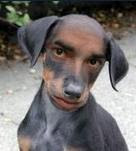





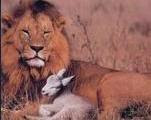




























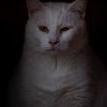


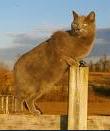




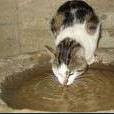













No comments:
Post a Comment